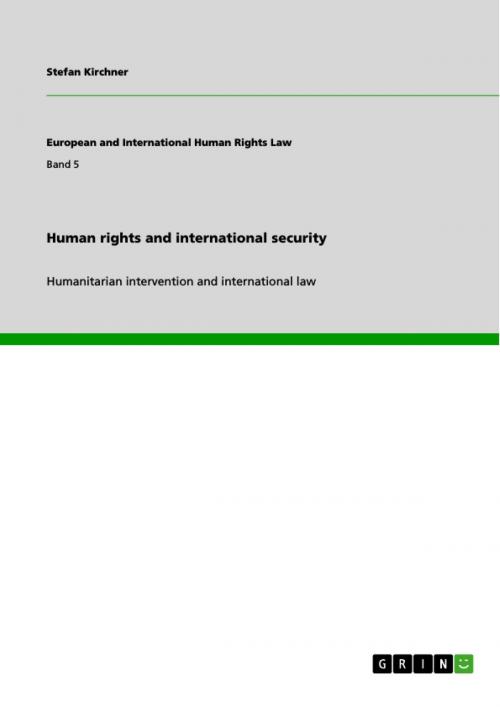Human rights and international security
Humanitarian intervention and international law
Nonfiction, Reference & Language, Law, International| Author: | Stefan Kirchner | ISBN: | 9783640192960 |
| Publisher: | GRIN Publishing | Publication: | October 21, 2008 |
| Imprint: | GRIN Publishing | Language: | English |
| Author: | Stefan Kirchner |
| ISBN: | 9783640192960 |
| Publisher: | GRIN Publishing |
| Publication: | October 21, 2008 |
| Imprint: | GRIN Publishing |
| Language: | English |
Document from the year 2008 in the subject Law - European and International Law, Intellectual Properties, , 70 entries in the bibliography, language: English, abstract: With the advent of Human Rights in international law, several core ideas of the traditional system of international law have been challenged, such as the principle of non-interference and state sovereignty, as well as the prohibition of the use of force, especially with the decision that massive human rights violations can form a threat to international peace and security to which the UN Security Council can respond with measures according to Chapter VII of the UN Charter. While at first sight a change of paradigm in international law, or in any legal system, is not negative per se, the rules which collide with a truly effective and universal protection of HR through international law are the very rules which form the foundation for international peace and security, the primary reason for the existence of international law. While international peace and security require the stability provided by the Westphalian system, they can at the same time be endangered by massive violations of human rights. On the other hand can Human Rights only be enjoyed in times of peace while the Westphalian system can limit the effective and universal enforcement of Human Rights in cases in which the UN Security Council has failed to take action under Chapter VII. This short book is an attempt at reconciling these needs which are at times direct against each other, at times interlinked ones with a special focus on massive violations of human rights which are not being addressed effectively by the UN Security Council. To this end, we will look at the Human Rights dimensions of international peace and security outlined above before we come to the core issue of the paper, the legality of the use of force for the protection of Human Rights in cases in which the UN Security Council fails to act, or, in other words, the question of in how far the need for universal respect for human rights can overrun the need for peace, given the links between both factors indicated above.
RA Dr. Stefan Kirchner, MJI, is an international legal consultant, admitted to the bar in Germany (www.marine-consulting-eu). He has worked at the Law of the Sea Division of the German Foreign Ministry in Berlin and at the German Federal Maritime and Hydrographic Agency. He has been Assistant Professor for the Law of the Sea in Kaunas and Associate Professor for Fundamental and Human Rights in Rovaniemi. After serving as Co-Chair of the Rights of Indigenous Peoples Interest Group of the American Society of International Law he now holds that position in ASIL's Law of the Sea Interest Group.
Document from the year 2008 in the subject Law - European and International Law, Intellectual Properties, , 70 entries in the bibliography, language: English, abstract: With the advent of Human Rights in international law, several core ideas of the traditional system of international law have been challenged, such as the principle of non-interference and state sovereignty, as well as the prohibition of the use of force, especially with the decision that massive human rights violations can form a threat to international peace and security to which the UN Security Council can respond with measures according to Chapter VII of the UN Charter. While at first sight a change of paradigm in international law, or in any legal system, is not negative per se, the rules which collide with a truly effective and universal protection of HR through international law are the very rules which form the foundation for international peace and security, the primary reason for the existence of international law. While international peace and security require the stability provided by the Westphalian system, they can at the same time be endangered by massive violations of human rights. On the other hand can Human Rights only be enjoyed in times of peace while the Westphalian system can limit the effective and universal enforcement of Human Rights in cases in which the UN Security Council has failed to take action under Chapter VII. This short book is an attempt at reconciling these needs which are at times direct against each other, at times interlinked ones with a special focus on massive violations of human rights which are not being addressed effectively by the UN Security Council. To this end, we will look at the Human Rights dimensions of international peace and security outlined above before we come to the core issue of the paper, the legality of the use of force for the protection of Human Rights in cases in which the UN Security Council fails to act, or, in other words, the question of in how far the need for universal respect for human rights can overrun the need for peace, given the links between both factors indicated above.
RA Dr. Stefan Kirchner, MJI, is an international legal consultant, admitted to the bar in Germany (www.marine-consulting-eu). He has worked at the Law of the Sea Division of the German Foreign Ministry in Berlin and at the German Federal Maritime and Hydrographic Agency. He has been Assistant Professor for the Law of the Sea in Kaunas and Associate Professor for Fundamental and Human Rights in Rovaniemi. After serving as Co-Chair of the Rights of Indigenous Peoples Interest Group of the American Society of International Law he now holds that position in ASIL's Law of the Sea Interest Group.















